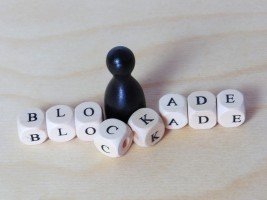Chemical warfare is the use of chemicals to enforce or remove people from somewhere or to wipe them out. In the use of war, chemical warfare dates back to a very long time ago with the use of poison tipped spears and arrows, that’s not the intended time period that I want to focus on. The Hague Declaration of 1899 and the Hague Convention of 1907 forbid the use of “poison or poisoned weapons” in warfare, and more than 124,000 tons of gas were produced by the end of World War I. The French were the first to use chemical weapons during the first world war, using the tear gases ethyl bromoacetate. Wondering why this was used to kill humans? It has a various amount of effects on the human body including, but not limited to, feeling of burning or irritated skin and a burning sensation in your eyes that can lead to blindness. Soldiers in the war were exposed to this with full contact. In some cases, the pain and burning would get to be too much and soldiers would often take there own lives. Chemical warfare hasn’t been used since the world wars. In Vietnam, a chemical compound was made code named Agent Orange and a herbicidal warfare program was launched. This compound was up to 50 times stronger then the normal agricultural chemicals used for killing plants. The plan was to destroy the dense jungle vegetation in order to spot the enemy and for eight years this substance was sprayed.
your eyes that can lead to blindness. Soldiers in the war were exposed to this with full contact. In some cases, the pain and burning would get to be too much and soldiers would often take there own lives. Chemical warfare hasn’t been used since the world wars. In Vietnam, a chemical compound was made code named Agent Orange and a herbicidal warfare program was launched. This compound was up to 50 times stronger then the normal agricultural chemicals used for killing plants. The plan was to destroy the dense jungle vegetation in order to spot the enemy and for eight years this substance was sprayed.
Chemical weapons and toxic industrial chemicals cause a various amount of symptoms in their victims. These symptoms depend on the chemical agent used and a victim of chemical exposure may s how a combination of symptoms. Some chemical agents cause death by interfering or attacking the nervous system. Some chemical agents restrict breathing and lead to death because of loss of breathing or consciousness or asphyxiation. Other chemical agents caused effects on contact. As a result, effective chemical attack treatment depends on identifying at least the type of chemical agent used. Also, chemical agents trapped on the body or clothes of victims may place first responders and medical professionals at risk. Chemical attacks can have severe effects on the body, causing mutation. If a survivor of chemical attack lives, them and their child will be at risk of severe and sometimes permanent effects. Children in Vietnam war weren’t just killed by agent orange but they were caught in the crossfire during firefights and unfortunately they lost their lives.
how a combination of symptoms. Some chemical agents cause death by interfering or attacking the nervous system. Some chemical agents restrict breathing and lead to death because of loss of breathing or consciousness or asphyxiation. Other chemical agents caused effects on contact. As a result, effective chemical attack treatment depends on identifying at least the type of chemical agent used. Also, chemical agents trapped on the body or clothes of victims may place first responders and medical professionals at risk. Chemical attacks can have severe effects on the body, causing mutation. If a survivor of chemical attack lives, them and their child will be at risk of severe and sometimes permanent effects. Children in Vietnam war weren’t just killed by agent orange but they were caught in the crossfire during firefights and unfortunately they lost their lives.
Featured Image: “RAF Regiment Gunners Wearing GSR Respirators” by: Uk Ministry of Defence @flickr.com
Additional Images: “NapalmBombing” by: SDASM Archives @flickr.com
Additional Images: “WailingMother” by: Manhhai @flickr.com









15 Comments
Very interesting article! 124,000 tons of gas is a lot to produce! Is there any way to dispose of it properly-if that’s even possible?
I agree with Kyle, very interesting! Is there a proper way to dispose to dispose it?
why would they use tear gas if they know there is a chance that it could affect them and take their lives as well
The proper way that they thought to dispose of it was to use in in mean of war. @KMichaud and @Bmadden They probably haven’t disposed of it they just most likely stored in case they need to use it again.
They disposed it by using it as a means of war.
@TNorris, they used it as a means of war they did not gas themselves they used it to clear trenches and to wipe out enemy troops.
This is a really interesting post. It is really sad and unfortunate. It makes me think how lucky I am where I stand in life. It is sad that this is what man-kind fell too.
This is horrific! I can’t believe that we did this!! It makes me think how lucky we are to have our lives and be where we are today. Also maybe you could talk about how these places are doing after the chemical attacks?
Wow! This was a very interesting post but also very sad! Do you believe we will use chemical warfare in the future? If so what will be the extremes?
Do you know believe chemical warfare is unethical in all circumstances?
I enjoyed this post, mostly because I’m a history buff and I have done a lot of research on the Great War (WWI). I would like to ask you however, what is your opinion on government services having active diseases and viruses in their labs? I realize it is for testing and that it is technically biological warfare but it is served in the same purpose and is equally deadly.
This post is really interesting. Is this the same stuff used in mace or pepper spray?
Great topic overall to talk about especially those who are interested in war- like times. Those who are interested in war- like times probably already now a few things about chemical warfare.
That’s so sad. What is happening in Syria today is just as terrible. How would you suggest the United States step in to stop the use of chemical weapons in the future? Develop a coalition against them, sign worldwide legislation?
Great topic overall really enjoyed learning about it! Although I was wondering what do you think the U.S should do to step in with the whole Syria thing I feel like we should step in. Great post though!